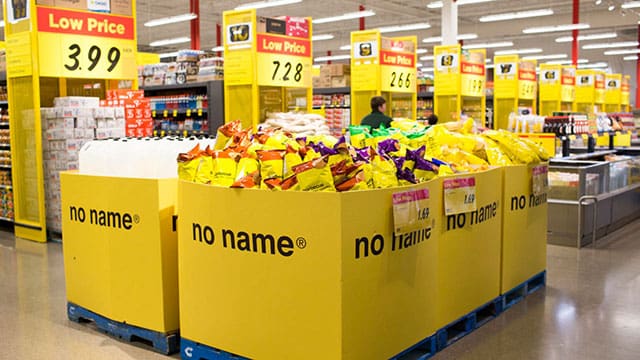Loblaw is shaking things up with its new No Name stores, which aim to pass on savings to consumers
 Canada’s recent railway shutdown has again exposed the difficulties of doing business in this country, particularly in sectors as critical as food distribution. To address these challenges, we are forced to turn to domestic solutions and policy changes that encourage more competition within the market.
Canada’s recent railway shutdown has again exposed the difficulties of doing business in this country, particularly in sectors as critical as food distribution. To address these challenges, we are forced to turn to domestic solutions and policy changes that encourage more competition within the market.
This brings us to a significant move by Loblaw, Canada’s largest grocery chain, which has just made an intriguing announcement that could redefine the competitive landscape of the grocery industry.
This fall, Loblaw plans to open three No Name stores in medium-sized Ontario cities – Ste-Catherines, Windsor, and Brockville. These stores will carry a limited selection of 1,300 products, primarily under the President’s Choice and No Name brands. Notably, these stores will operate without a cold chain, meaning no refrigerators or freezers will be used. The concept is minimalist: no frills, just basic shelving stocked with shelf-stable food, supported by a skeleton staff and housed in modest real estate. The goal is clear: keep operating costs low to pass on savings to consumers.
 Image courtesy Loblaw |
| Related Stories |
| Stretchflation is the latest threat to your grocery bill
|
| Changing consumer behaviour boosts in-store food sales
|
| Food prices are dropping, but no one cares
|
For a company with a near-ubiquitous presence across Canada, it’s surprising that Loblaw continues to find new opportunities to expand. However, what’s even more striking is the company’s willingness to potentially cannibalize its own market share by opening these new stores. This move suggests that Loblaw is unafraid to disrupt its own business model to stay ahead of the competition.
Historically, Canadian grocers have been very territorial, often concentrating on markets along the country’s old rail lines – a throwback to an earlier time in commerce. However, in today’s world, where consumers are more informed and price-conscious, this outdated “rail track” mentality – rigid and stuck on one path – is becoming less and less relevant.
The idea of self-cannibalization has long been a nightmare for grocers, deterring them from expanding in ways that could increase competition and offer Canadians more choices. However, Loblaw’s decision to launch these No Name stores marks a significant departure from this mindset, recognizing that the competitive landscape has evolved, especially in the wake of recent food inflation.
Now more than ever, consumers are astute bargain hunters, diversifying their shopping habits beyond traditional grocery stores to dollar stores, discount retailers like Giant Tiger, and even mass merchandisers such as Walmart. Loblaw’s new No Name stores are a strategic response to this shift, aiming to bring budget-conscious shoppers back under the Loblaw umbrella.
This announcement follows another significant move by Loblaw in June, when it revealed plans to open 40 new No Frills stores, each spanning 15,000 square feet. Both initiatives underscore a growing trend: discounts are paramount and will likely remain so for the foreseeable future. While interest rates are gradually decreasing, the pace is too slow to provide immediate relief to consumers, many of whom are trimming their budgets wherever possible, including their grocery bills.
Another factor at play is the uneven service across different markets. While hyper-urban areas like Toronto, Montreal, Vancouver, and Calgary boast numerous grocery options, smaller or medium-sized cities often suffer from limited competition – a legacy of that old “rail track” mindset. Loblaw has astutely identified this gap and is seizing the opportunity to better serve consumers in these underserved areas, which straddle the line between rural and urban.
Whether this strategy will succeed remains to be seen. However, if it does, Loblaw could quickly scale this No Name concept nationwide. So, Canadians should not be surprised if these minimalist stores pop up in their communities, regardless of where they live.
Loblaw’s move signals a broader trend within the industry: the growing importance of adaptability and innovation in response to shifting consumer demands and economic realities. As competition intensifies, we can expect more bold moves from major players in the market, each vying for a piece of the increasingly frugal consumer’s dollar.
Dr. Sylvain Charlebois, a Canadian professor and researcher specializing in food distribution and policy, is a senior director of the Agri-Food Analytics Lab at Dalhousie University in Halifax, Nova Scotia. He is frequently cited in the media for his insights on food prices, agricultural trends, and the global food supply chain.
For interview requests, click here.
The opinions expressed by our columnists and contributors are theirs alone and do not inherently or expressly reflect the views of our publication.
© Troy Media
Troy Media is an editorial content provider to media outlets and its own hosted community news outlets across Canada.
